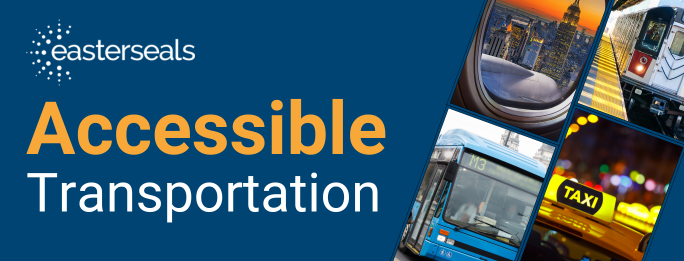
For Immediate Release
Ahead of Holiday Travel Season, Easterseals to Launch Campaign to Make Air Travel More Accessible
Chicago, IL, November 20, 2023
Media Contact:
Sharon Watson, Easterseals
swatson@easterseals.com
Cornerstone of campaign is a months-long public service announcement running nationwide
The PSA highlights how every day nearly 31 wheelchairs are destroyed or damaged by air lines, disrupting lives, sometimes for months
Watch the PSA here
Ahead of a busy holiday travel season, Easterseals announced today it is launching a nationwide campaign to make air travel more accessible. The cornerstone of the campaign is a two month-long public service announcement (PSA) running nationwide during the busy holiday travel season on national cable. Easterseals is calling on the United States to commit to making air travel accessible by the 40th anniversary of the Air Carrier Access Act in 2026.
“While we’ve seen significant progress in making some forms of transportation more accessible since the passage of the Americans with Disabilities Act, air travel continues to be an unachievable dream for people with disabilities who cannot fly and a horrific nightmare for those who can,” said Kendra Davenport, President and CEO of Easterseals. “It doesn’t have to be this way. Easterseals is calling on the United States government, airports, the airline industry, airplane manufacturers, and disability advocates to come together and build an air travel system that is accessible to everyone by no later than 2026.”
Since the passage of the ADA, train, bus, and cruise ship travel have become accessible. Unfortunately, air travel is exempted from the protections afforded travelers by the ADA. Despite the Air Carrier Access Act that was meant to promote accessibility, our air travel system has not done nearly enough to ensure Americans with disabilities have safe, efficient, and reliable travel options
Passengers with disabilities face burdensome obstacles at nearly every step of the air travel experience.
- They arrive at airports and often experience excessive waits for check-in assistance and wheelchairs.
- They’re frequently subjected to mishandled security screenings by TSA agents who would benefit from more training on the needs of travelers with disabilities.
- When they arrive at their gate, passengers with disabilities are forced to give up their wheelchairs. Airlines are the only major transportation method that requires passengers to abandon their wheelchairs. Airline-issued chairs are designed to fit in an airplane aisle, and they are often too small for most individuals, lack adequate padding, and easily tip over. Airline personnel frequently lack training in how to safely transfer a person with disabilities from an airline-issued wheelchair to their seat. This process exposes people with disabilities to the risk of both humiliation and serious injury.
- When boarding the plane, there are often no braille placards for restrooms or seat numbers.
- Most domestic flights are not equipped with bathrooms accessible for people with mobility disabilities.
- Infotainment systems are inaccessible for many people with disabilities because they frequently do not have features like braille for passengers with vision disabilities or captions for those with hearing disabilities. Passengers with mobility disabilities are also frequently unable to access an infotainment system because they have difficulty using the system’s touchscreen or remote.
Each day, an average of 31 wheelchairs are damaged when stored by airline personnel. Last year, there were more than 11,000 incidents of damaged wheelchairs. In addition to leaving travelers with disabilities without the mobility devices that allow them to function in the world safely (sometimes for months), damaged wheelchairs can also result in health complications and lost wages.
Fully accessible air travel would benefit us all, not just the 61 million Americans with disabilities. Consumers with disabilities and their families activate more than $22 billion in buying power and have $490 billion in disposable income. More accessible leisure and business travel would mean more passengers for airlines, more planes sold by airplane manufacturers, as well as more jobs and opportunities for everyone. Not to mention the benefits to society of having a more inclusive world in which people with disabilities can fully participate.
About Easterseals
Easterseals is leading the way to full equity, inclusion, and access through life-changing disability and community services. Trusted by families for more than 100 years, we have worked tirelessly with our partners to enhance quality of life and expand local access to healthcare, education, and employment opportunities. And we won’t rest until every one of us is valued, respected, and accepted. Through our national network of Affiliates, Easterseals provides essential services and on-the-ground supports to millions of individuals and their families each year – from early childhood programs for the critical first five years, to autism services, transportation services, medical rehabilitation and employment programs, veterans’ services, and more. Our public education, policy, and advocacy initiatives positively shape perceptions and address the urgent and evolving needs of the one in four Americans with disabilities today. Together, we’re empowering people with disabilities, families, and communities to be full and equal participants in society. To learn more, visit www.easterseals.com.




 “Streaming is both accessible and not accessible,” Evans said. “The streaming part itself is accessible, in that it allows me to make my own schedule, and I can work it around my disabilities. However, the inaccessible part is the demand for content creators to constantly be networking, attending events and continuously pushing out content. I cannot attend events, and if I can they’re incredible stressful, so all my work networking has basically been done online, which thankfully is becoming a more acceptable side of content creation.”
“Streaming is both accessible and not accessible,” Evans said. “The streaming part itself is accessible, in that it allows me to make my own schedule, and I can work it around my disabilities. However, the inaccessible part is the demand for content creators to constantly be networking, attending events and continuously pushing out content. I cannot attend events, and if I can they’re incredible stressful, so all my work networking has basically been done online, which thankfully is becoming a more acceptable side of content creation.” “I must say over the years it has become less and less accessible for me,” Martínez said. “SMA (Spinal Muscular Atrophy) causes strength, endurance and mobility loss as time passes. I can’t use a physical keyboard as I used to, so it’s been years now with an on-screen keyboard. Voice dictation doesn’t work well for me due to my voice being inconsistent, not to mention my accent. In English it can go from totally wrong to acceptable. In Spanish, my native language, it works better.”
“I must say over the years it has become less and less accessible for me,” Martínez said. “SMA (Spinal Muscular Atrophy) causes strength, endurance and mobility loss as time passes. I can’t use a physical keyboard as I used to, so it’s been years now with an on-screen keyboard. Voice dictation doesn’t work well for me due to my voice being inconsistent, not to mention my accent. In English it can go from totally wrong to acceptable. In Spanish, my native language, it works better.” “What drew me to consulting was the opportunity to leverage my unique perspective as both an able-bodied and disabled gamer to improve the gaming experience for others,” Lane said. “I can share the frustrations I’ve faced as a disabled gamer and use that knowledge to advocate for better accessibility features. Companies and studios that I work with go the extra mile to make sure I have everything I need to succeed.”
“What drew me to consulting was the opportunity to leverage my unique perspective as both an able-bodied and disabled gamer to improve the gaming experience for others,” Lane said. “I can share the frustrations I’ve faced as a disabled gamer and use that knowledge to advocate for better accessibility features. Companies and studios that I work with go the extra mile to make sure I have everything I need to succeed.”





Connect with us on social media